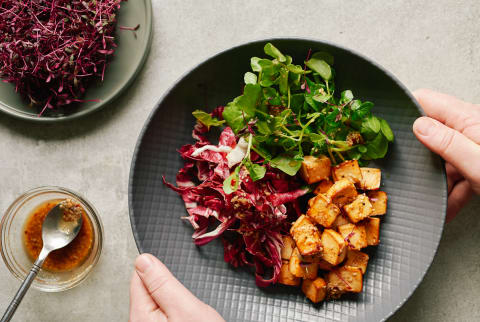Advertisement
The Diet (And Specific Food) That Might Help With Menopause Symptoms


People going through menopause can generally commiserate over a few shared experiences—such as uncomfortable symptoms like hot flashes. Fortunately, there are natural ways to manage common menopause symptoms.
OB/GYN Suzanne Gilberg-Lenz, M.D., previously shared with us that some select natural supplements and adaptogens may help. And now, a study published in the Journal of the North American Menopause Society has linked dietary adjustments to symptom relief, as well.
The diet that might offer relief from hot flashes (and more)
According to the study, published earlier this month, a low-fat, vegan diet, specifically one that includes ½ cup of cooked soybeans daily, helped postmenopausal women decrease the number of hot flashes they reported by a whopping 79%. But not only that: The numbers showed that the frequency of moderate to severe hot flashes decreased by 84%, so the hot flashes the women were experiencing were less likely to be, well, brutal.
Though it was a smaller study (there were only 38 participants), the results show a strong correlation among that select group.
"About 80% of postmenopausal women have hot flashes in North America," explains Neal Barnard, M.D., FACC, a key author of the study. "But researchers noticed that in Japan, hot flashes were rare when the diet was more rice-based, but they became quite common when meat and dairy products became popular, suggesting a role for diet."
The group of 38 women, with an average age of 54, was split into two groups: One followed the specific vegan diet, and the other half followed control protocols. The women tracked their symptoms using apps and digital reporting. Those who were following the vegan diet also ate non-GMO whole soybeans, which Barnard explains were cooked in an Instant Pot, but participants could choose how to incorporate them.
What does a low-fat vegan diet look like?
The vegan diet the participants followed looked like many plant-based diets: It emphasized fruits, vegetables, whole grains, and legumes—and of course, the required ½ cup of soybeans per day.
The key difference between this diet and a classic vegan diet was that fattier foods, like oils, nuts, and avocado, were limited. There were some other adjustments too: All participants, whether following the diet or not, were asked to limit their alcohol intake to one drink per day, if any.
Why soybeans?
"Soybeans contain isoflavones," explains Barnard, "which appear to be effective against hot flashes [according to previous research]. And one of these isoflavones is called daidzein. It's converted by your gut bacteria into another one called equal, which might be particularly effective against hot flashes.
But if you're not on a healthy diet, you probably can't convert the daidzein to equol." For that reason, the team designing this study elected to pursue a combination of a healthy diet with the inclusion of whole soy as an intervention for hot flashes.
The takeaway
In a video shared by the researchers, participants were quick to mention how easy this intervention was—and though it was a small study, it has some pretty impressive results for such a straightforward lifestyle shift.
While dietary changes shouldn't be taken lightly—and it always helps to seek guidance from a nutrition expert—this study presents some evidence that diet may be a powerful tool in helping to manage postmenopausal symptoms.

Why Nutrition Is Key To Changing Your Relationship With Alcohol
Brooke Scheller, DCN, CNS

Why Alcohol Sabotages Your Gut Health & How To Get Back On Track
Brooke Scheller, DCN, CNS

Why Nutrition Is Key To Changing Your Relationship With Alcohol
Brooke Scheller, DCN, CNS

Why Alcohol Sabotages Your Gut Health & How To Get Back On Track
Brooke Scheller, DCN, CNS

Why Nutrition Is Key To Changing Your Relationship With Alcohol
Brooke Scheller, DCN, CNS

Why Alcohol Sabotages Your Gut Health & How To Get Back On Track
Brooke Scheller, DCN, CNS

Why Nutrition Is Key To Changing Your Relationship With Alcohol
Brooke Scheller, DCN, CNS

Why Alcohol Sabotages Your Gut Health & How To Get Back On Track
Brooke Scheller, DCN, CNS














